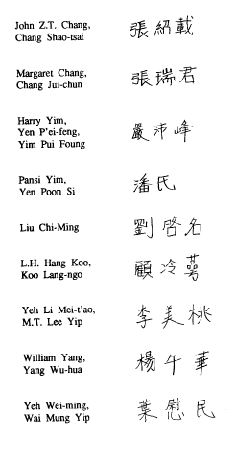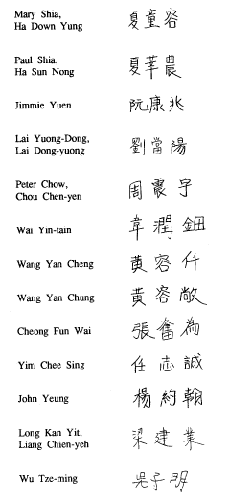
|
Macau Bahá'í Community in the Early Years
by Barbara R. Sims
 |
chapter 12 | start page | single page |
Chapter 13
To the Bahá'ís of Macau
Ridván 1989
Dearly loved friends,
On the occasion of your first National Convention we convey our warm greetings and express our admiration for the sterling accomplishments of your dearly loved community since the Knights of Bahá'u'lláh opened Macau in response to the call of the beloved Guardian at the commencement of the Ten Year Crusade.
The early years of the Bahá'í community in Macau witnessed many struggles and uncertainties, but the steadfast and devoted efforts of the pioneers and local believers over the years have won for you the privilege of entering a new and highly promising phase of development, fully vindicating the decision to establish this Ridván a new National Spiritual Assembly on the doorstep of China.
A new spirit is manifest; new challenges are before you; new opportunities are evident as your community crosses the threshold to independence and assumes new tasks and responsibilities. Precious new souls have joined your ranks. As they become increasingly aware of the part they should play in the ever-unfolding destiny of the Macau Bahá'í community and are encouraged to participate in its affairs they will greatly assist in advancing the Cause of Bahá'u'lláh in the region.
Barely a decade separates Macau from its return to its homeland, that vast and ancient land which in these days is the object of so much hope and promise. The role of the Macau Bahá'í community in establishing the Faith of Bahá'u'lláh among the Chinese people is patently clear. Its future is bright; its steadfastness and dedication are daily being exemplified.
We are confident that the light of guidance will burn ever more radiantly in Macau, that nothing in this changing world will deter you from pursuing your goals and that you will attract added blessings and divine confirmations.
Be assured that our loving prayers will surround you. We will supplicate at the Holy Threshold that you will be continually strengthened and that you will attain the high honor of fulfilling your glorious destiny.
With loving Bahá'í greetings,
(signed) The Universal House of Justice

click for larger image
The first National Spiritual Assembly of the Bahá'ís of Macau elected Ridván 1989. Hand of the Cause Amatu'l-Bahá Rúhíyyih Khánum represented the Universal House of Justice on this occasion as she had done some years earlier at the first election of the National Spiritual Assembly of the Bahá'ís of Hong Kong. Seated: Mrs. Sheevash Farid, Miss Candy Fok, Mrs. Myriam Marrero, Amatu'l-Bahá Rúhíyyih Khánum, Counsellor Bijan Farid, Mrs. Lee Tsui Siu Hing, and Miss Annie Ng. Standing: Mr. Herbert Lee, Mr. Donald Tennant, Mr. Kong Siew Huat and Mr. Dale Eng.

Mr. Yim, the first Chinese Bahá'í in Macau, happily attending the first Annual Convention of the Bahá'ís of Macau, 1989.

click for larger image
The first National Convention of the Bahá'ís of Macau, 1989. Amatu'l-Bahá Rúhíyyih Khánum is sitting in the middle, wearing a veil.


Afterword
During a speech in the London Congress, mentioned in the early part of this record, Hand of the Cause Mr. A.Q. Faizi, indicated that we should never forget the early believers, because we are "standing on their shoulders," that is, we are standing on their service, standing on what they built.
As the Macau community was under the jurisdiction of the National Spiritual Assembly of the Bahá'ís of North East Asia from 1957 until 1974 there was a variety of material, letters, reports and some photographs in the National Bahá'í Archives in Tokyo. Before that, from 1953 to 1957 the Macau community corresponded directly with the Asia Teaching Committee of the National Spiritual Assembly of the Bahá'ís of the United States. Fortunately copies of some of the very early correspondence turned up in Mr. Yim's papers in Macau.
As with writing the history of the Faith in Japan, the compiler talked to as many Bahá'ís as she could find who knew about this subject. But there were not many, and sometimes there were great discrepancies between an individual's memories of events and events as they were recorded at the time. In such cases we relied on written records when they were available.
The compiler, who was a member of the first National Spiritual Assembly of the Bahá'ís North East Asia, made use of all material she came upon, not only in Japan, but also in Macau and Hong Kong. The research for this account was taken from primary research sources. As it is a "first", so to speak, for Macau, great attention was paid to detail; the compiler felt that more was better than less. One might wonder at the attempt to record such details as a chronological list of early believers. Often the span of their activities was extremely short and soon they disappeared. We are reminded of a phrase of Bahá'u'lláh, "The whole duty of man in this Day is to attain that share of the flood of grace which God poureth forth for him. Let none, therefore, consider the largeness or smallness of the receptacle. The portion of some might lie in the palm of a man's hand, the portion of others might fill a cup, and of others even a gallon-measure." (from Gleanings from the Writings of Bahá'u'lláh)
If some of the early believers had only a palmful to receive — or to give — still we must honor them, as the Faith, seemingly so small and insignificant in those early days, needed their bit. Who is to say that when the Faith shines with full glory in ages to come those bits may not equal oceans?
The Chinese names posed problems for the compiler. Often the Chinese Bahá'ís when speaking or writing in English preferred to use English first names that they had selected, to go with simplified phonetic surnames (or family names). And sometimes the Chinese names had two or three different transliterations or different ways of writing. We have tried to include as much information as possible regarding Chinese names. For some of the names we could find the original Chinese characters which we have included in an end chapter.
Mrs. Mary Shia was not the first Chinese woman to become a Bahá'í. There were others, though not many. But she was the first in Macau and the first woman of Chinese background to become an active Bahá'í in Hong Kong.
Mr. Anthony Seto (1890-1957), who was born in Hawaii of Chinese parents was the first Chinese-American Bahá'í. He and his wife became Bahá'ís in the fall of 1916 in Hawaii. About May 1916 a mainland Chinese, Mr. Chen Hai An, who was studying in the United States, apparently became a Bahá'í. He eventually returned to Shanghai, China and there is no record of him after that.
 |
chapter 12 | start page | single page |
|
|